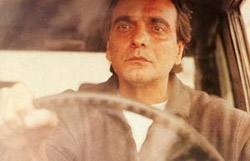
© 1998 Zeitgeist Films
 |
| Photo
© 1997 Abbas Kiarostami Productions/CiBy 2000; © 1998 Zeitgeist Films |
| Cannes Film Festival (1997): Palme d'Or (Best Picture; tie) | |
| National Society of Film Critics: Best Foreign-Language Film | |
| Boston Society of Film Critics: Best Foreign-Language Film |
| Permalink | Home | 1998 | ABC | Blog |